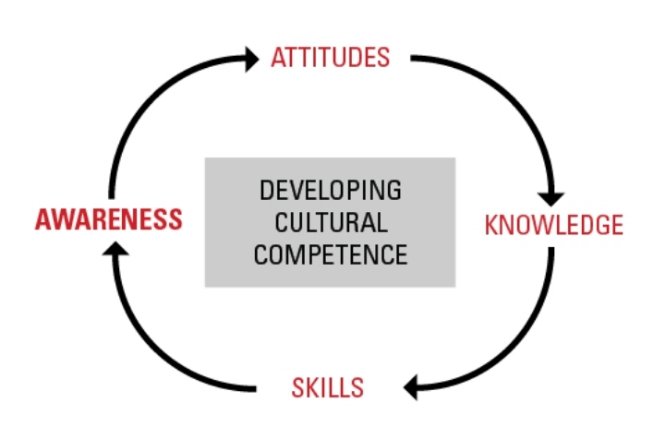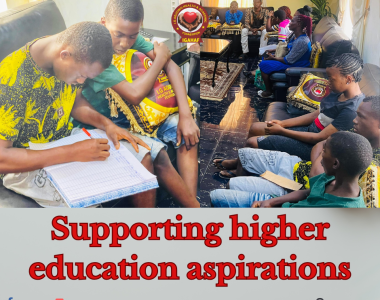
Introduction
Culture is a set of beliefs and values shared by a particular group of people or individuals based on their geographical location and background. Cultural competence is the ability to interact effectively with people from different backgrounds without attaching stereotypes or judging their beliefs, values, and cultural diversity. It is a skill beyond merely being aware of cultural differences, but actively observing, learning and seeking to understand, accept, and appreciate the impact of cultural norms on individual lifestyles. The educational sector is made up of individuals from different cultural backgrounds and this makes it crucial to incorporate diverse perspectives and experiences into the academic curriculum to help students understand other viewpoints and experiences as well as their own culture. Recognition of the impact of culture on students’ learning styles, communication preferences, and behaviour will play a vital role in achieving respect and acceptance in the school environment. Cultural competence in education has emerged as a crucial area of focus in contemporary education aiming to create an inclusive learning environment that prepares students for a future in multicultural sectors and environments. It is an ongoing process of learning to understand and respect cultural differences ensuring that everyone feels safe and confident to express themselves and accept their background. It ensures that all students receive a high-quality education while feeling supported and valued irrespective of their cultural background.

The importance of cultural competence in education
Promotes inclusivity: cultural competence in education helps to create a welcoming and inclusive learning environment where students and educators are aware and sensitive to the cultural diversity in their school. Understanding the impact of this diversity will foster an accommodating environment that allows students the opportunity to be themselves without the fear of exclusion in school activities and learning approach because educators will ensure to incorporate diverse teaching methods and inclusive curricula that would be accommodating to different cultures, beliefs, and values, while students would be more open-minded and respectful towards the diverse cultures of their peers and schoolmates.
Improves communication: Cultural competence breaks the barrier of discrimination and encourages acceptance and respect. Understanding cultural diversity and its impact on people’s way of life will equip students and educators with skills to ensure effective communication in schools. By understanding the unique challenges and needs of students from different cultural backgrounds, educators can tailor their instructions and support services to ensure that all students have equal opportunities for success.
Prepares students for a global society: In an increasingly interconnected and diverse world early teaching of cultural competency is key to achieving a society where people’s interest is considered and their opinions respected. By exposing students to different cultures and perspectives, educators help them become open-minded, empathetic, and understanding, this increases the chance of a peaceful society. Cultural competency encourages students to challenge stereotypes, reduce biases, and promote mutual respect when they find themselves in the global society.
Supports students’ success: By integrating cultural competence into the education curriculum, educators can help students develop a positive self-image and build confidence in their abilities. Cultural competency will also ensure that the teaching approach in schools is accommodating thereby motivating students’ interest and increasing their chance of success. Research has shown that students perform better academically in environments where they feel that their cultural identities are recognized and respected.
Strategies for teaching and implementing cultural competence
Integrating multicultural curriculum and resources: educators must ensure to integration diverse range of cultural perspectives into their curriculum. They must be intentional about selecting teaching materials and resources that represent a variety of cultures, histories, and contributions to foster a more comprehensive understanding of the world. There should be provision for elective classes where students have the opportunity to select courses that resonate with their cultural background, beliefs, and values. Every student should be provided with the opportunity to learn about diverse cultures, beliefs, and backgrounds, so they will learn to respect and appreciate these differences instead of attacking them.
Professional development for educators: Educators should be trained and equipped with knowledge of cultural competence so they can effectively teach it and as well incorporate it into their teaching method or approach. Professional development training is vital for educators, this training can be achieved by organizing seminars, workshops, and capacity-building sessions aimed at equipping both old and new teachers with skills to promote their teaching competence.
Conclusion Cultural competence in education is crucial for creating an equitable learning environment that promotes equity, diversity, and inclusion, empowering all students to reach their full potential. Cultural competency teaches students to respect one another and also encourages open-minded acceptance of diverse cultures without judgements.



